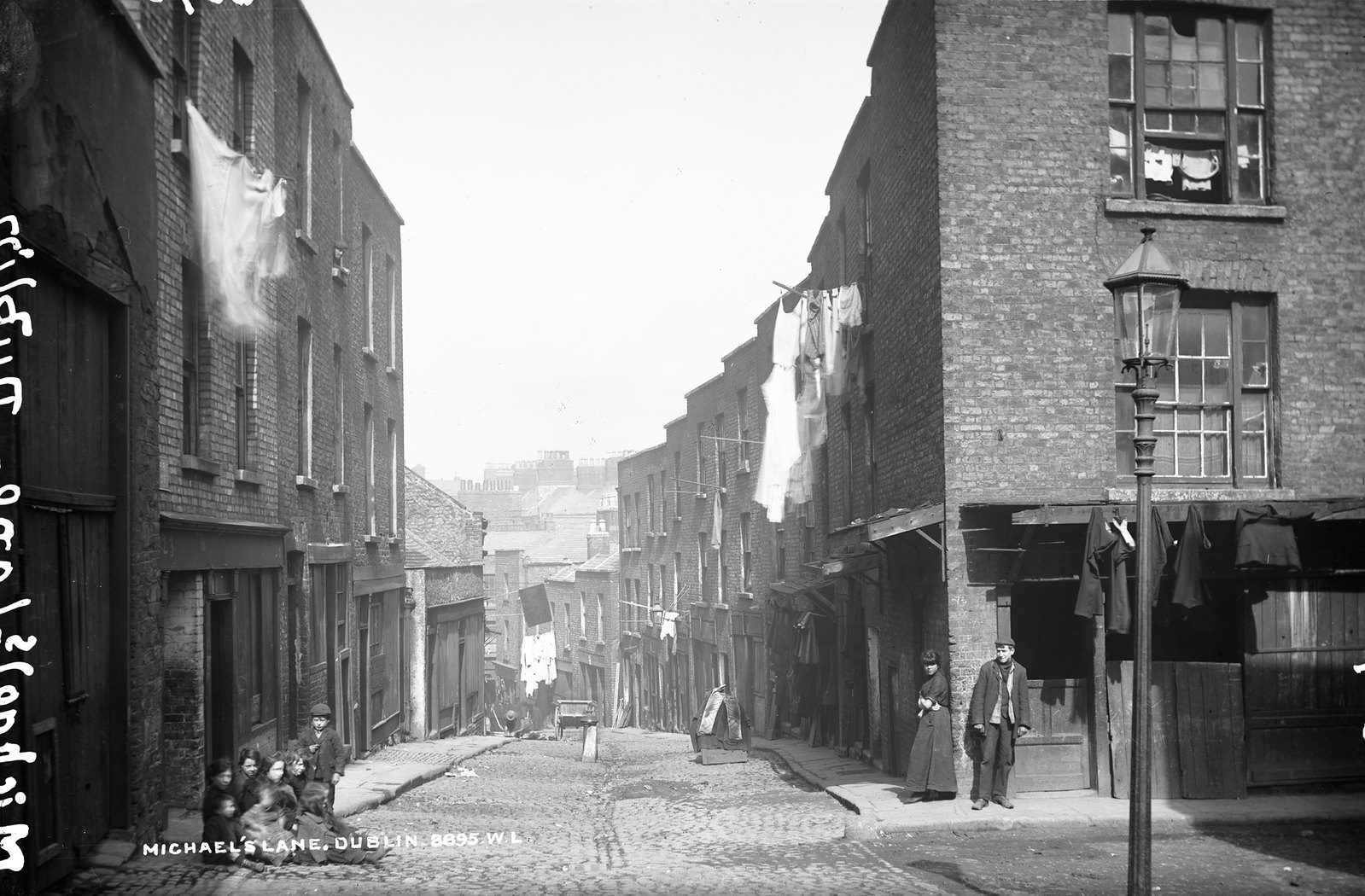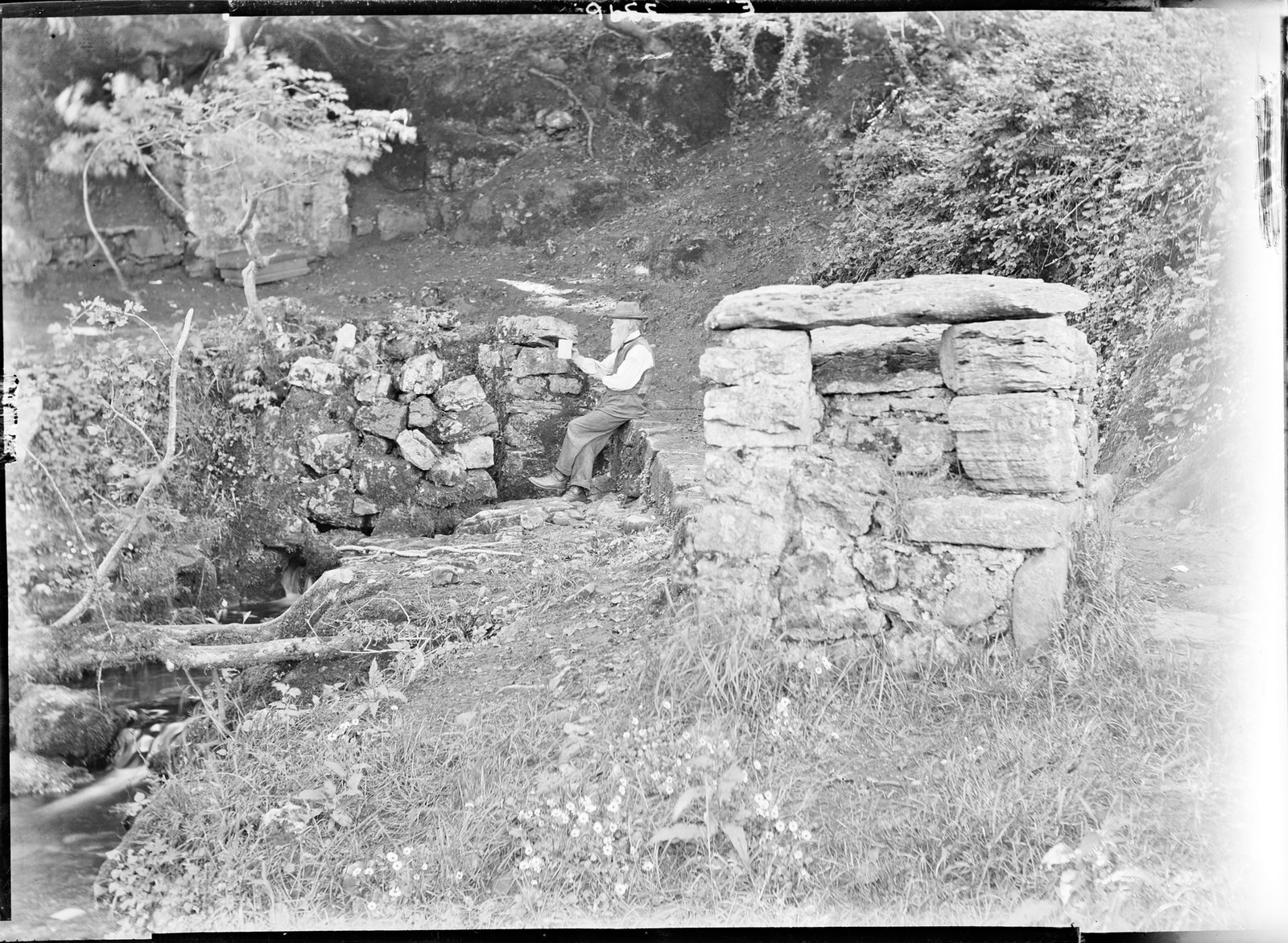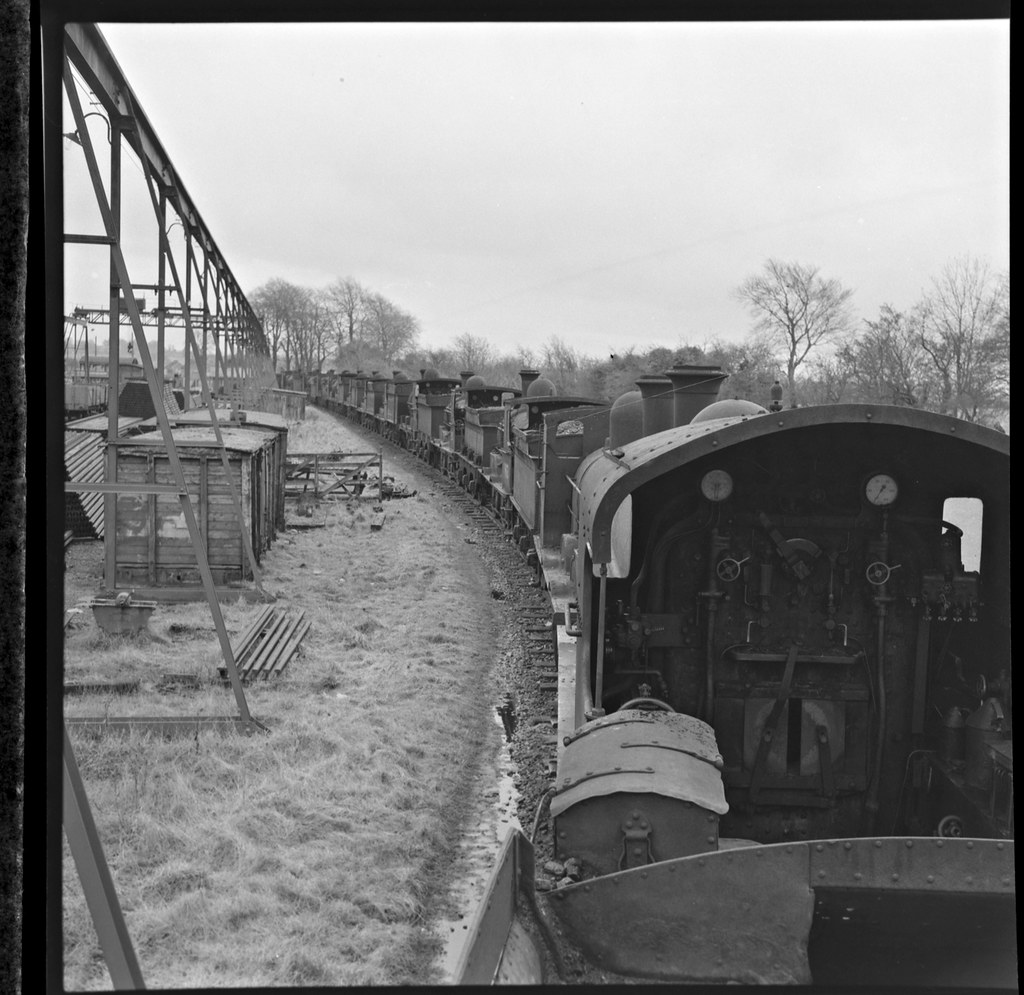
Michael's Lane, Dublin City. St Michael's lane close to Christ Church was a particularly poverty-stricken area, with three or four families to each house in the lane. The main profession (as seemingly evidenced by what we see hanging around -- other than the kids!) was that of "clothes fixer".: photo by Robert French, c. late 19th/early 20th c. (Lawrence Photograph Collection, National Library of Ireland)
MIDSUMMER SESSIONS -- Green-Street
The Recorder, with Aldermen Sir G. Whiteford and Morrison sat yesterday.
Michael Purcell, Samuel Walsh, Anne Walsh and Margaret Flanagan were indicted for assaulting John Bolton and stealing from his person several bank notes and sovereigns amounting in all to 54/.
John Bolton examined -- I am a pig-jobber. I met the prisoner Purcell in Michaels-lane, early on the 20th of June, in a house in which I was robbed of twelve shillings; I then put myself under his protection, and asked him where I could get a respectable lodging for the night; he induced me to go to Walsh's public-house in Exchequer-street, where I got a noggin of whiskey; on our way there I showed him all the money I had, and said I was very fortunate not to have lost it all where I lost the twelve shillings; I had 25l in notes and 29 sovereigns; it was in a back-room I got the whiskey, and Purcell and Anne Flanagan followed me there; Flanagan made several overtures of friendship to me, but I told her I would have nothing at all to do with her; I then gave Mrs. Walsh a half sovereign for whiskey, and she returned a bad one for it, which I swear, most positively was not the one I gave her (witness here produced the half sovereign). I got all my sovereigns weighed before I left England; but for the curiosity of the thing, I put it in my mouth and gave her a note. She kept the change so long as made me get into a passion, and say, that I would go away and come back again for it. When I was going off, Purcell caught hold of me, and knocked me down, and then I lost my money; Flanagan was present at the time, but I can't say she laid her hands in me; Mrs. Walsh saw the whole transaction, and Walsh himself was at the door, and let the others out so quietly as induced me to believe that he was concerned with them in robbing me; Purcell went out first and Flanagan stopped behind him for a few minutes.
A watchman proved that the pig-jobber called on him in Exchequer-street, and said he was robbed in Walsh's house; that Walsh followed him and charged Anne Flanagan, whom she took to Clarendon-street watch-house; that when she was being removed from that to Fleet-street, she said, "we have done a good job."
Another watchman corroborated the statement.
Several other witnesses were examined for the defence.
Purcell and Flanagan were found guilty of the stealing, and the Walsh's were acquitted.
The RECORDER. -- The sentence of the court is that you, Michael Purcell, be transported beyond the seas for seven years; and that you, Anne Flanagan, be imprisoned for twelve months and kept to hard labour.
-- Freeman's Journal, Thursday 22 June 1830

The Old Man of the Holy Well, Tobernalt holy well, near to Sligo, County Sligo. Some believe the name may mean "Well of the Insane" (Tobar na nGealt). (Cistercians used the nearby Cottage Island as an asylum for lepers and the insane in medieval times. These people would likely have rowed the short distance across the lake to visit the Holy Well in search of a cure.): photographer unknown, c. 1900-1939 (Eason Photograph Collection, National Library of Ireland)
To-morrow is Saint Valentine's day,
All in the morning betime,
And I a maid at your window,
To be your Valentine.
Then up he rose, and donn'd his clothes,
And dupp'd the chamber-door;
Let in the maid, that out a maid
Never departed more.
William Shakespeare (1564-1616): The Tragedy of Hamlet, Prince of Denmark (1600-1601), Act IV, Scene V

A sad parade of old engines going to scrap, Mullingar, County Westmeath: photo by James O'Dea, 14 February 1963 (O'Dea Photographic Collection, National Library of Ireland)



6 comments:
Bit of a personal note here. In the century before last my maternal great grandparents ran a shop in Mullingar, County Westmeath (see sad parade of engines, bottom photo in this post), wherein my grandmother Kathleen, eldest of the brood, toiled till she had earned enough to cover the transatlantic passage that made possible the circumstance whereby she and a young man named Thomas from County Kerry were inclined in the direction celebrated on St Valentine's Day.
The scene in the top shot seems to have been at least as impoverished as it appears. Improvement over the past century can hardly be described as dramatic.
Google streetview of same location seen in top photo: St Michaels Close, Dublin, May 2014
We've all been to the Well of the Insane at one time or another. It's the navigating of the return leg of the voyage counts.
The sad parade of engines going off to scrap touches the flinty old heart in a most curious way (wonder why that is).
I knew Winetavern Street to pass through before they demolished it, and loved the effect of height which the steepness of the hill accentuated in the buildings. Never, that I can remember, was in St, Michael's lane, though I remember many similar streets in the area. The newly built version is truly horrible, though. Hostile to play or conversation or any sort of lingering.
Mullingar I recall just as one of the extremely long (it seemed at the time, to this child) station halts on the train route between Dublin and Galway. I think it was there that I was lifted to the window to talk with the driver or coalman in an engine going in the opposite direction. I just recall his overpowering, and very sooty, geniality.
Splendid of you to testify, Trevor.
Kathleen's tales of Mullingar were amplified over time in the family by the memories of her several siblings (Gaynors they were) as one by one they too migrated from Westmeath to America; I suppose such lore tends to change and grow as it travels, but the common sense of the thing seemed to be that the family kept a shop on the main road, selling all manner of sundries, which got its custom from those passing through -- and if such voyagers were ever to escape with any money still in their pockets, it was thought to have been a disappointment of sorts.
(A matter of perspective certainly, on that latter point.)
Thanks, Tom. Another excellent post. A great sean-nós singer (and friend back in the day) named Tim Lyons recorded a mock-heroic song about Mullingar that I've always loved. Here it is by the late Seamus Creagh (known more as a fiddler): https://www.youtube.com/watch?v=8dWcX-p129I; and here's one of mine inspired by the Mullingar song: https://www.youtube.com/watch?v=LRHqWPbnkBQ
Terry, that's brilliant. In light of such glories, one is left to wonder how anyone can ever have left Mullingar. The spacious workhouse and airy barracks sound particularly worth boasting about. Those lasses with tapered ankles that scrape the ground might have hoped for pavement, but then, I suppose the great days of the improvements still lay ahead, like us... Though are we improvements? And if so, upon what?
I see there are a number of enthralling renditions of the Mullingar Song, none lacking for spirit, one must say,
Tommy Tupper sings in praise of the City of Mullingar in Clonakilty GAD grounds, County Cork
Obviously Baltimore was going to have some catching up to do, but with its crime-free streets and majestic Bromo-Seltzer Tower, the dazzling cosmopolitanism sounds almost a fair match.
(Another charming element in the mystical halo or aura which surrounded Mullingar and its region in my childish imagination was the ambient woodland or shall I say bogland leprechaun population. My grandmother had a stereopticon viewer with magical 3-d slides in which the "little people", as she called them, seemed to be hiding out behind every magical incandescent tree; she assured me I would be able to see them once my eyes had been trained to do so; but alas I fear any useful education I was ever going to get was well over by that time, and all the rest would be nothing but mere sipping from the tarnished cup of mundane prose and myopic literalism.)
Great post Tom, quite a shock to see St. Michael's Lane then and now -- what a difference a hundred or so years makes . . . must be the luck of the Irish? And nice to find Ophelia's Valentine's song here (we'll be talking about it tomorrow in the Shakespeare class . . . would that we could here Tommy Tupper singing it).
Post a Comment